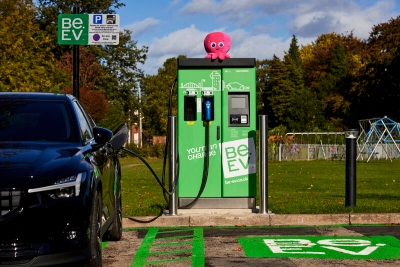Octopus Energy Generation, one of Europe’s largest renewable energy investors, is allocating up to £110m on behalf of its Sky fund (ORI SCSp) for Manchester-based public EV charging network Be.EV to scale and install new charge points across the UK.
Octopus Energy already supplies all Be.EV chargers with 100% green electricity. The deal will help grow Be.EV’s 150-strong public charge point network, with Be.EV committed to adding 1,000 further charge points across the North of England and beyond by 2024.
The move will increase Be.EV’s charge point coverage by over 600% and positions the Manchester-based business as a leader in the transition to electric vehicles.
Public EV charge points are currently unevenly distributed in the UK, skewed towards London. Research from Department for Transport shows London has the highest level of charging provision per 100,000 of the population, at 102. For comparison, the North West has 24 for every 100,000 people.
Octopus’ backing means Be.EV, which already operates Greater Manchester’s largest public EV charging network, can address this imbalance at speed.
Its unique model builds concentrated, community-based charging networks where they’re most needed to ensure fair access to public chargers in all communities and to instil consumer confidence in the transition to electric vehicles no matter where they’re based.
Matt Setchell, co-head of Octopus Energy Generation’s fund management team: “Our first foray into funding EV charging infrastructure is a significant milestone. We’re accelerating the green energy transition, with more deals coming up to turbocharge it. As a nation, we need to rapidly build more EV charge points to meet the growing number of drivers going electric. Easy and fair access to chargers will help phase out petrol-guzzling cars once and for all.”
Asif Ghafoor, CEO and co-founder of Be.EV: “Everybody, not just the wealthy, must be able to make the switch to electric cars but currently people who live outside London or in less affluent areas are underserved by public EV charging. If you live in a flat or terrace, you can’t charge at home. This investment addresses that imbalance and helps kickstart a national infrastructure effort that, for once, doesn’t start in London.
“The backing from Octopus is transformational for us. We have sites lined up and underway that will form dense clusters of chargers that give people the confidence to go electric. We’re also building infrastructure that communities can be proud of, reinventing charging locations as green neighbourhood hubs and developing iconic designs. Octopus’ support means we can take this unique approach to other parts of the country, addressing the imbalance in charging provision across north and south, urban and rural communities.”
This deal marks the next step in Octopus Energy Group’s advancement of EVs. Its EV roaming service Electric Universe makes charging EVs simple as drivers use one card and app to access over 310,000 public charge points from a range of brands globally. As part of this agreement, Be.EV will be joining Electric Universe, alongside the 460+ other charging networks on the platform.
In addition, Octopus’ Electric Vehicles division makes the switch to electric cars easy with initiatives like its all-you-need EV package, providing drivers with a car, charger and bespoke electricity tariff.
This latest deal will support the 456,000 EVs** on UK roads today. With over half of drivers aged 16 to 49 years in the UK likely to switch to an EV in the next decade***, the EV market is set to massively grow – and access to public chargers will play a vital role.
More about Octopus Energy Generation here: https://www.octopusenergygeneration.com
* Department for Transport, Electric Vehicle charging device statistics: January 2022, showing how London has the highest level of charging provision per 100,000 of population, at 102. For comparison, the North West has 24 for every 100,000 people.
** The RAC’s ‘The road to electric – in charts and data’, 2022 estimates
*** Over half of younger drivers likely to switch to electric in next decade, ONS Census 2021, October 2021

